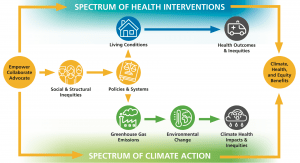Cameron McElmurry’s blog post describes the locust swarms currently ravaging farms in the Horn of Africa. While reading, I recognized the injustice that many face as they experience crises caused by climate change and are forgotten while the world focuses on COVID-19. Worldwide, millions will face food insecurity and depleted agricultural incomes because of disasters such as this.
Cameron’s post reminded me of the “triple inequality” topic discussed in class. In terms of the current climate crises that are affecting the world, developing countries most often take the brunt of the short term effects. The triple inequality concept includes asymmetric impacts (follow the link for examples), responsibility (those who are most affected by climate change often have the least to do with it), and less capacity to adapt (less infrastructure and ability to rebuild or respond to disasters).
Climate change is known to increase inequality, so, as developing countries experience more agricultural failure (droughts, pests, etc.) due to new climate disasters, they will have even less money and resources to make further changes, continuing the cycle of this triple inequality.
Another topic we have discussed in class is the racial disparities present in the food system. A recent article describes the increased inequality of minority Americans during the COVID-19 crisis. It discusses how industrial regions of the country have high populations of minority workers and are disproportionately hit by hurricanes, fossil fuel pollution, cancer and other diseases as result of chemical and pollutant exposure, and now, coronavirus cases. This reveals the reality of triple inequality in America, where particular people groups are systematically affected by the means of production and climate changes that occur as a result of the environmental degradation supported by big business.
It is evident that at home and abroad, we must advocate for those affected by climate change and forgotten during the COVID-19 crisis.



I primi replica panerai prodotti da Wilsdorf & Davis erano marchiati “W&D” (le iniziali visibili all’interno della cassa). Hans Wilsdorf ha registrato il marchio “Rolex” a La Chaux-de-Fonds, in Svizzera, nel 1908.
Patek Philippe SA è un produttore svizzero di orologi di lusso fondato nel 1839, con sede nel Canton Ginevra e nella Vallée de Joux. Dal 1932 è di proprietà della famiglia Stern in Svizzera, Patek Philippe è uno dei più antichi produttori di orologi al mondo con una storia orologiera ininterrotta sin dalla sua fondazione. Progetta e produce orologi e movimenti, inclusi alcuni degli orologi meccanici più complicati. L’azienda gestisce oltre 400 punti vendita al dettaglio a livello globale e oltre una dozzina di centri di distribuzione in Asia, Europa, Nord America e Oceania. Nel 2001 ha aperto il Museo Patek Philippe a Ginevra.https://www.orologilusso.eu/
In response to the idea that perhaps triple inequality is applicable
with the coronavirus pandemic as well, I think the more accurate take-away is that the three tenets of the triple inequality concept apply to other spheres of our well being, not just in what we eat and the environment we live in, but our social lives too.
The three tenets of the triple inequality concept are that 1.) the ones at fault are not the ones most impacted, 2.) that the ones impacted have the lowest means of coping or adapting to these problems, and 3.) there are “asymmetric impacts”, meaning there are different outcomes for the two groups (in the original concept, the developing and the developed worlds, but perhaps in the connection regarding racial disparities, this could be indicative of race being a social determinant of one’s health during the coronavirus pandemic).
I might add too, that due to racially based medicine, which occurs all too often for people of color, that a white doctor might diagnose it as a personal fault, COPD or asthma, for instance, instead of pushing for COVID-19 testing, whereas a doctor belonging to a similar minority group as the patient might be more inclined to get lab testing done, and less likely to blame the patient for contracting this disease, that perhaps grips people of color disproportionately, over white people. It might also be something like that people of color might because of our historically white institutions, such as the medical industry, that perhaps white doctors and white civilians are making the policies that prevent minority groups from getting adequate medical coverage, or gives them less desirable benefits from their jobs, thus leading to a deeper problem caused by whites, and disproportionately affecting minority groups and low income whites. In terms of their diminished ability to adapt or cope, I 100% agree, this is due to their fighting their own battles or not fighting at all, because they don’t have allies in the majority group, that advocate for them. As we have heard time and time again, we will not make it through this pandemic if we are against each other, we needed to come together (while still social distancing ourselves), to make it through this, and survive.